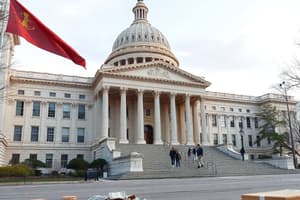Podcast
Questions and Answers
What does the term 'polity' primarily refer to?
What does the term 'polity' primarily refer to?
- A type of economic system
- A political entity organized under a government (correct)
- A social movement for change
- An ideology promoting individual freedoms
Which type of polity is characterized by rule by a single individual?
Which type of polity is characterized by rule by a single individual?
- Monarchy (correct)
- Oligarchy
- Democracy
- Theocracy
In which type of polity does power rest with a small group of individuals or organizations?
In which type of polity does power rest with a small group of individuals or organizations?
- Authoritarianism
- Oligarchy (correct)
- Democracy
- Totalitarianism
What best describes totalitarianism?
What best describes totalitarianism?
Which function of a polity involves creating laws and regulations?
Which function of a polity involves creating laws and regulations?
What does the term 'sovereignty' refer to in the context of polity?
What does the term 'sovereignty' refer to in the context of polity?
Which of the following is a key concept in polity that shapes political behavior?
Which of the following is a key concept in polity that shapes political behavior?
What is a significant challenge faced by modern polities?
What is a significant challenge faced by modern polities?
Flashcards are hidden until you start studying
Study Notes
Definition of Polity
- Polity refers to a political entity or community organized under a government.
- It encompasses the structure of government, institutions, and political processes.
Types of Polities
-
Democracy
- Power rests with the people; elections determine leadership.
- Examples: Direct democracy, representative democracy.
-
Monarchy
- Rule by a single person, usually a king or queen.
- Can be absolute (full power) or constitutional (limited by laws).
-
Oligarchy
- Control by a small group of individuals or organizations.
- Power based on wealth, family ties, or military control.
-
Theocracy
- Governance based on religious laws and principles.
- Leaders are often religious figures or institutions.
-
Authoritarianism
- Centralized control by a single authority or party.
- Limited political freedoms and opposition suppression.
-
Totalitarianism
- An extreme form of authoritarianism.
- The state seeks to control all aspects of public and private life.
Key Concepts in Polity
- Sovereignty: The supreme authority within a territory.
- Political Culture: The set of attitudes and beliefs that shape political behavior in a society.
- Political Ideology: A set of beliefs about politics that form a framework for understanding the political world (e.g., liberalism, conservatism).
- Civil Society: The space between government and the private sector, encompassing voluntary organizations and institutions.
Functions of a Polity
- Legislation: Creating laws and regulations.
- Representation: Serving and representing the interests of constituents.
- Governance: Implementing policies and managing public affairs.
- Conflict Resolution: Addressing disputes and ensuring justice.
Importance of Polity
- Establishes the framework for how power is distributed and exercised in society.
- Influences social order, stability, and the overall quality of life for citizens.
- Shapes economic policies and social programs that affect everyday life.
Interaction with Other Disciplines
- Political Science: Study of political behavior, systems, and theory.
- Sociology: Examines the relationship between polity and society.
- Economics: Analyzes the impact of political decisions on economic performance.
Challenges in Modern Polities
- Corruption and lack of transparency.
- Political polarization and ideological extremism.
- Globalization and its effect on national sovereignty.
- Emerging technologies and their influence on governance.
Study Tips
- Understand different political systems and their characteristics.
- Analyze historical examples of various polities to recognize their development.
- Keep abreast of current events that illustrate dynamics within different political systems.
Studying That Suits You
Use AI to generate personalized quizzes and flashcards to suit your learning preferences.




